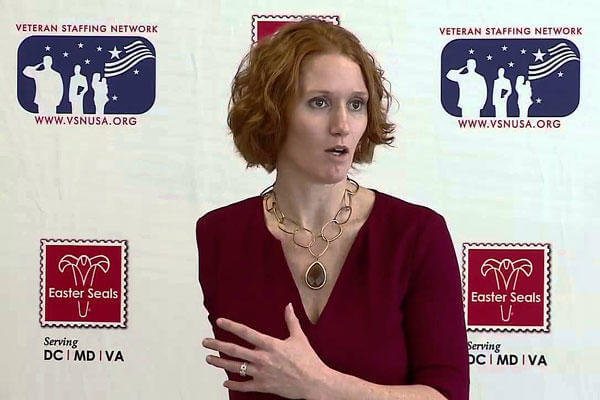When combat-wounded veteran Dawn Halfaker learned she was pregnant, she thought that the Department of Veterans Affairs would help coordinate her care and pay related bills.
But Halfaker quickly found that the VA was not much help, leaving her on her own to find a provider and pay for services.
"If the VA is going to outsource maternity care, it should be seamless and include the full range of services," she told the House Veterans Affairs Committee on Thursday.
Halfaker, an Army military police captain who lost her right arm in an ambush during the Iraq War, testified before Congress on access and quality of VA health care for women.
The VA says there are currently more than two million women veterans in the U.S., with about 400,000 using VA health care. With more women in the military serving in roles that exposed them to combat, a greater number have returned from Iraq and Afghanistan with war wounds and injuries.
More women reporting military sexual assaults have also begun seeking care for trauma.
The result has been greater numbers of women are looking for VA health care.
The VA covers maternity care, including primary care, specialty care, mental health care and more. But it provides maternity care though agreements and contracts with community providers.
Halfaker said a maternity services coordinator was provided by the VA, but she was left on her own to find a doctor who would work under a VA contract based on Medicare terms. And when subsequent tests along with an echocardiogram and lab work was not paid for by the VA, she ended up fielding dunning letters threatening her credit rating.
A $1,700 bill from Children's Hospital in Washington, D.C., was paid by the VA only after she threatened her VA care coordinator that she would speak to Congress, she said.
Patricia Hayes, chief consultant for Women's Health Services with the Veterans Health Administration, conceded that "we didn't do what we needed to do for" Halfaker.
Her care coordinator should have been in touch with her regularly and set up and scheduled the full range of services for her physical, social and psychological health during the pregnancy, Hayes said.
Rep. Phil Roe, R-Tennessee, a former Army doctor and also an obstetrician, said one of the takeaways from the testimony is that the VA has "to pay the bills."
"That's not very hard. That should be fixable today or tomorrow," he said. The lawmaker also said the VA should compile a list of health care providers it can share with expecting veterans so they do not have to go out and find one on their own.
-- Bryant Jordan can be reached at bryant.jordan@military.com.






























